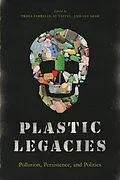There is virtually nowhere on earth that remains untouched by plastics and the situation presents a serious threat to our natural world. Despite the magnitude of the problem, the interventions most often put in place are consumer-led and market-based and only nominally capable of addressing the issue. As the problem worsens and neoliberal ideologies limit the world's responses to this crisis, there is a growing need for legislative frameworks that attend to the complex social and ecological issues associated with plastics.
The contributors to this volume bring expertise from across academic disciplines to illustrate how plastics are produced, consumed, and discarded and to find holistic and integrated approaches that demonstrate an understanding of the wide-ranging problem. From the plasticization of earth's oceans to the endocrine disrupting chemicals that have the potential to seriously harm life as we know it, these essays beg the question that we all must answer: what is our plastic legacy?
With contributions by: Imogen E. Napper, Sabine Pahl, Richard C. Thompson, Sasha Adkins, Stephanie B. Borrelle, Jennifer Provencher, Tina Ngata, Sven Bergmann, Christina Gerhardt, Elyse Stanes, Tridibesh Dey, Mike Michael, Laura McLauchlan, Johanne Tarpgaard, Deirdre McKay, Padmapani Perez, Lei Xiaoyu, and John Holland.
Vorwort
From the plasticization of earth's oceans to the endocrine disrupting chemicals that have the potential to seriously harm life as we know it, these essays beg the question that we all must answer: what is our plastic legacy?
Autorentext
TRISIA FARRELLY is a senior lecturer in social anthropology and co-director of the Political Ecology Research Centre at Massey University, Aotearoa New Zealand. SY TAFFEL is a senior lecturer in media studies and co-director of the Political Ecology Research Centre at Massey University, Aotearoa New Zealand. IAN SHAW is an author and broadcaster as well as a professor of toxicology at the University of Canterbury.
Inhalt
Acknowledgements
Introduction: Our Plastic Inheritance / Trisia Farrelly, Sy Taffel, and Ian Shaw
Part I: Pollution
1. Marine Litter: Are There Solutions to This Global Environmental Problem? / Imogen E. Napper, Sabine Pahl, and Richard C. Thompson2. Slow Violence: The Erosion of Marine Plastic Debris and of Human Health / Sasha Adkins3. How Seabirds and Indigenous Science Illustrate the Legacies of Plastics Pollution / Stephanie B. Borrelle, Jennifer Provencher, and Tina Ngata4. Dawn of the Plastisphere: An Experiment with Unpredictable Effects / Sven Bergmann
Part II: Persistence
5. Plastiglomerate: Plastics, Geology, and the New Materialism of the Anthropocene / Christina Gerhardt6. Dressed in Plastic: The Persistence of Polyester Clothes / Elyse Stanes7. Caring for the Multiple Cares of Plastics / Tridibesh Dey and Mike Michael8. On Becoming a Massively Distributed Thing: Hedgehogs, Plastics, and the Bearable Lightness of Becoming / Laura McLauchlan
Part III: Politics
9. Communicative Capitalism, Technological Solutionism, and The Ocean Cleanup / Sy Taffel10. Toward Large-Scale Social Change and Plastic Politics: An Anthropological Perspective on the Practices of a Danish Environmental Organization / Johanne Tarpgaard11. Plastics Talk/Talking Plastics: The Communicative Power of Plasticity / Deirdre McKay, Padmapani Perez, and Lei Xiaoyu12. Redressing the Faustian Bargains of Plastics Economies / Trisia Farrelly, Ian Shaw, and John Holland
Conclusion: Where There's a Will . . . Contesting Our Plastic Inheritance / Trisia Farrelly
List of Contributors
